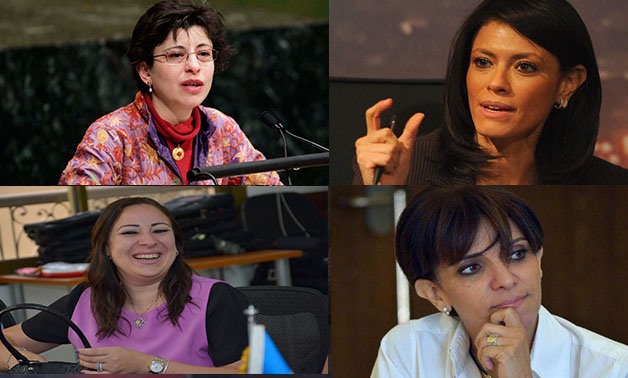
FILE - Rania Al-Mashat, International Monetary Fund (IMF) advisor, Shaden Khallaf, senior policy advisor for the Middle East and North Africa Bureau at the UNHCR, Azza Karam, UNFPA senior advisor and Jacinthe Rihan, Program Area Manager for Greater Cairo
CAIRO - 5 December 2017: Many inspirational Egyptian women have overcome all barriers, from gender, age, race and nationality, to land the highest positions in some of the most influential global institutions for development. Each is playing a vital role in the international arena, whether socially, culturally or economically—and they are all worthy role models for every Egyptian girl.
Azza Karam … Toward a diverse and tolerant global community:

As a senior advisor on culture at the UNFPA, Azza Karam pioneers international efforts to adapt human development with religious and cultural diversity, working with religious NGOs and leaders worldwide. Karam is also the chair of a UN system-wide taskforce on religion, where she has the responsibility to convene 20 different UN system entities (including the World Bank) on a regular basis, and to support their efforts to learn from one another about how to engage religious NGOs and leaders in the UN program and activities.
Brought up in a home of strong believers, where showing respect for all faiths and responsibility to others was paramount, she grew up to advocate religious diversity. As the daughter of a diplomat and later a frequent traveler, Karam lived as a wanderer for years, and that’s when she came to realize the importance of honest and dignified communication with others who may not share the same language, or even values.
Karam credits her career today to an education that she was “fortunate” to obtain, as well as the rules she had to follow at home. Her mother was her role model for balancing a career with keeping a well-managed family, while her diplomat father taught her the need to be diligent and cautious in respectful communication and in working toward a common goal, Karam recalls. “My education taught me how to be deeply self-critical and analytical; and exposure to other cultures taught me the value of comparisons, thus learning that the world was never either black or white, but the wonder of God’s creation is precisely in our diversity,” Karam says.
From her first university degree from the American University in Cairo, all the way to her doctorate at the University of Amsterdam and post-doctorate work, Karam has focused on the relationship between religion, states and human rights, eventually occupying some of the most prestigious positions at the UN and international institutions as a respectable expert of multi-religious collaboration, international gender issues, democratization, human rights, conflict and political Islam. “I live to realize my faith-in-action,” she says. “I strive to be at once respectful and inclusive of the diversity of beliefs, political, social and cultural realities and orientations, as well as mandates and modes of working.”
As well as working in one of the most controversial fields in the contemporary international arena, being an Arab, a Muslim and a woman have been challenging for Karam. Her lifetime passion for religions and peace have driven her into a contentious field, almost exclusively dominated by males, westerns, and mostly Christians. However, a lifelong advocate for women’s rights and gender equality, Karam has never looked at her gender as a drawback, but rather a virtue that led her to acquire more strength, and a driving force to excel in her career.
“We, as Egyptian women, deserve to be representatives of our own realities, in the global space of the UN system, in ways which can honor the balance between different nation-states and the gender breakdowns therein,” Karam says, stressing how privileged she feels “to be able to learn from, and to serve in an international organization dedicated to human rights, peace and security, and sustainable human development.”
Prior to joining the UNFPA, Karam worked for the World Conference of Religions for Peace, the International Institute for Democracy and Electoral Assistance and the United Nations Development Program, among other organizations. She has also founded the first Global Women of Faith Network, which brings together women of faith working on the frontline to communicate and learn from each other and to build bridges and partnerships.
She has authored several books and articles including Transnational Political Islam (2004); Islamisms, Women and the State (1998); Women in Parliament: Beyond Numbers (1998) and Woman’s Place: Religious Women as Public Actor (2001).
“Work hard for what you love to do and for what you believe in. Have faith that even if those around you do not notice or recognize or even resent you for what you do and who you are, there is a God who is Just and Gracious and Merciful—and who lives within each of us. Decent work is, eventually, rewarded; and in the meantime, it is a blessing and a privilege one must learn to be thankful for.”—Azza Karam
This article is part of Egypt Today’s campaign “Break the Silence ... Say No to Violence” marking the 16-Day campaign of activism against gender-based violence GBV from November 25 to December 10. In a series of articles we document the journey of inspirational women who made it to the top in the world of development and NGOs including, Rania Al-Mashat, International Monetary Fund (IMF) advisor, Shaden Khallaf, senior policy advisor for the Middle East and North Africa Bureau at the UNHCR (United Nations High Commissioner for Refugees), Azza Karam, UNFPA (United Nations Population Fund) senior advisor and Jacinthe Rihan, Program Area Manager for Greater Cairo and Delta at Plan International Egypt. The four women




Comments
Leave a Comment